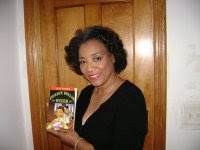Thanksgiving weekend officially began the Christmas shopping season. In our tough economic times, many of us will be shopping at the dollar stores in order to save money while buying items that give us a good value for an inexpensive price. As each and every one of us makes the decision to shop at one store or another, I want to bring to your attention the death of a young black woman named Taneka Talley and the dollar store where she had worked.
Taneka was employed at a Dollar Tree in Fairfield, Calif. In March, 2006 while on the job, she was stabbed to death by a white male customer who reportedly wanted to kill the first black person he saw. Taneka, who was a single parent, left behind a then 8-year-old son who is now being raised by Taneka's mom.
The travesty of Taneka Talley's death doesn't just end with her murder. In California, there is a state law that says if a worker is killed on the job, Taneka's son would be eligible to file for state workers' compensation benefits. But according to media accounts, Dollar Tree, via its insurance company, Specialty Risk Services, is fighting the payout. Why? Because there is another caveat to that California law, which states if the person who was killed had a "personal" relationship with the killer, then the workers' comp benefits aren't payable. The intent of that law was to prevent payouts when a worker is killed on the job by someone they know.
So did Taneka Talley have a relationship with the white man who killed her? No, she didn't. So how is it that the insurance company is now denying her heir the money to which he should be legally entitled if the man who killed his mom didn't even know her? Well, it seems a lawyer who represents Specialty Risk Services has managed to come up with a "personal" connection between the victim and her killer. The alleged killer killed Taneka Talley because she was black. Therefore the murder was a "racially motivated crime" and as such, then the "crime" was "personal," and therefore they don't have to pay the claim.
Huh? A woman is at work doing her job and is subsequently killed at work by a customer who is a complete stranger, but because that stranger hated black people, the crime is now "personal" and therefore the insurance claim benefits can be denied. Does everyone who reads this story understand the implications of this? A woman can be murdered by someone she didn't know and, according to former chief judge in the state's Division of Worker's Compensation, Steven Siemers, "this would be the first case where a hate crime, in and of itself, established a personal connection."
Taneka's family, after learning of the denial of the benefit payout, is reportedly using their legal options against Dollar Tree. But the legal implications of this case are far-reaching. The "alleged" killer was only charged with murder and not a "hate crime." But the "hate crime" aspect is the reason the attorneys for Dollar Tree have used the logic to make the crime "personal." The killer was not charged with a "hate crime," but rather the charge against him was simply "murder."
As the final outcome of this case evolves, I will keep you informed either via this column or my blog. In the meantime, people should think twice before giving Dollar Tree another dollar.
You Finished The Book - Now What Did You Think
13 years ago

3 comments:
Ms Westside,
Can you say "Bad Lawyer!"
I knew you could. Why do they constantly have to seek out the loophole instead of doing the right thing?
By the way, a terrible crime.
Although I don't like the outcome, I do admire the logic. Hate is very emotional and therefore personal. For all the people who have advocated for "hate crime" sentencings, this is a wake up call.
Murder is hate and no one needs to have a specific category added in addition to it. I have never been a supporter of the "hate crime" concept and this case should cause those who are proponents of it to have second and third thoughts.
Post a Comment